Saltburn
Up the peasants! Down the gentry!
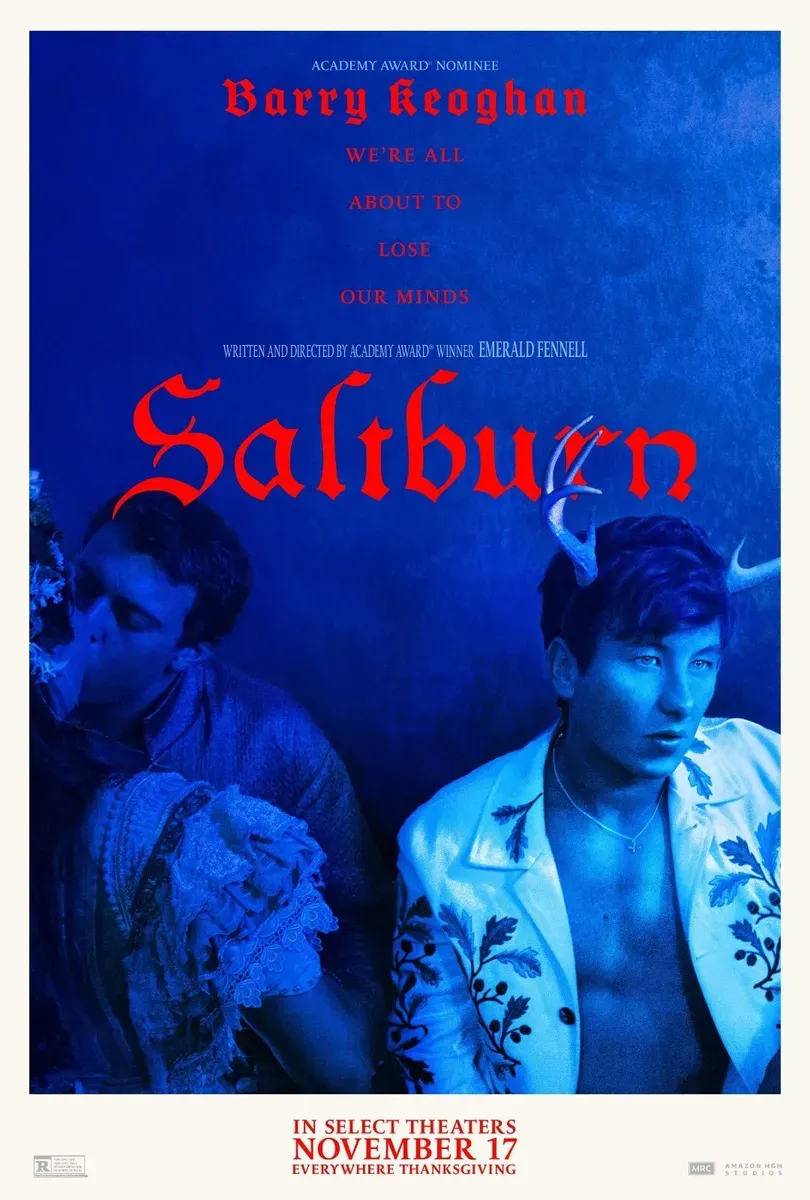
Troubled by his classmate's unfortunate living situation, wealthy Oxford student Felix Catton invites his new friend Oliver Quick to come and stay with him at his family estate over the summer, only for a series of horrifying events to befall his family.
Oxford, in this film at least, seems to be inhabited solely by too rich and too privileged, overgrown fashionista influencer babies, all of whom smoke, but very obviously none of whom actually know how to smoke, lots of that whole “immediately exhale without actually inhaling, while quickly blinking through watering eyes” thing going on in the background. It’s basically a bunch of kids who are too cool for school, but are actually only really capable of operating within the cloistered confines of that school. It’s all one big “terrible person” farm, and it looks like there’s another bumper crop this year, the year of 2006.
Oliver Quick né Twist is there on scholarship, one of the few poor orphans who have found themselves there by luck and the sweat of their brow, no connections, no family name, no wealth, but he is light years smarter than pretty much everyone else there, and he knows it.
He also loves a lanky beanstalk of a boy with Justin Bieber hair by the name of Felix Catton. From afar, of course, Oliver is a shy introvert, unless you challenge his work while in class.
When a chance encounter brings Oliver to Felix’s attention, he ends up being pulled headfirst into an intoxicating world of wealth and parties and generally fucking off as you will when you will, all at Felix’s side. Felix, meanwhile, is drawn to Oliver’s poor background of neglect and poverty, a melancholy dirge about a lonely only child with a dead father and a junky mother, so he brings Oliver into his life like he was a muddy puppy found in a rain-choked gutter. At the end of the year, Felix invites Oliver to come home with him that summer to his family estate in the English countryside, a sprawling old stone manse called Saltburn.
Saltburn is aged and sun-dappled, dripping with history and implied wealth, forever on the edge of being coated in dust, its crystal chandeliers all strung with strips of fly-speckled flypaper. It is the very definition of what you would imagine the estate of an English Lord to look like, most likely because it’s often used for tv and film projects.
Felix’s family are all happily indolent and given to tedious loquacity, or as it’s known in more polite circles, they’re eccentric, or in less polite circles, thoroughly full of shit. They’re very worldly in a way that makes them seem both alien and also surprisingly stupid, sincerely asking one another questions like “Where IS Liverpool?” while they loiter in the library, but without any actual interest in an answer, and having no issue with the fact that they don’t get one. They’re also constantly smoking, but at least they all seem to know how to actually smoke, so there’s that at least. Each one an Olympic class boozehound, moving through an endless series of balls and parties and dinners, they are the end product of the “terrible person” factory. At one point, Felix’s mother, Elspeth Catton, while regaling them with tales of her exploits in the days of Britpop, rebuts the belief that the song “Common People” by Pulp was actually written about her, citing the line “she came from Greece, she has a thirst for knowledge” saying “it couldn’t have been me! I’ve never wanted to know anything.“
How droll, darlings.
And so, Oliver spends a dream-like summer living in a world of casual excesses, spending his days lazing by the pool, verbally sparring with the American cousin Farleigh, flattering Elspeth, and discussing Saltburn’s history with Felix’s father, Sir James Catton. He spends his nights fucking around with Felix’s attention-starved and burned-out party girl cousin, Venetia, and peeping on Felix while he masturbates, even going so far as slurping the spunk-filled bath water from the drain.

He’s a weird kid.
Honestly, there’s a lot of shit going on with the bathtub in this film…
It’s easy to forget that Oliver is very smart, very clever, but he is shown preparing for his interactions with the family, gathering information on them, and then using it to manipulate them, seemingly with ease too. Soon enough, Felix’s family is planning on throwing Oliver a big birthday party on the great lawn.
And through all of this, the family charity case, their American cousin, Farleigh is constantly watching Oliver as he grows bolder and better at navigating this world. The competition between the two of them for the scraps from Felix’s table begins to grow heated, and soon enough, it’s discovered that Farleigh has tried to steal something from the house, in an attempt to sell it, and is banished from the grounds.
More’s the pity.
But it turns out Oliver has been lying about his entire background, in fact, he’s been lying quite a bit about his upper middle class background actually, with his very much alive father, and completely sober mother, and multiple sisters. Oliver has been lying to his family about his life now too. Oliver is a huge liar. Felix catches him at it, while trying to do something nice for Oliver, and he’s not happy about it. He tells Oliver that it’s best that he go home after his big birthday party, that his idyllic summer is over. Oliver tries to plead his case, confronting Felix in the center of Saltburn’s hedge maze, but Felix rejects him, and Oliver is forced to face the fact that his whole new world is now crumbling. But when the sun rises the next day following Oliver’s birthday party, Felix is found dead in the center of the hedge maze, having overdosed.
Terrible tragedy, that.
Lunch was certainly a dreary affair.
A shroud of grief befalls Saltburn. Like a terrible farce, when the police come to investigate, they keep getting lost in the hedge maze. A gardener had to be dispatched to help lead them through the maze. It’s raining and gray, as if the heavens themselves weep at Felix’s passing. Through it all, Oliver stays at Saltburn with the family. He also fucks Felix’s freshly filled-in grave while crying.
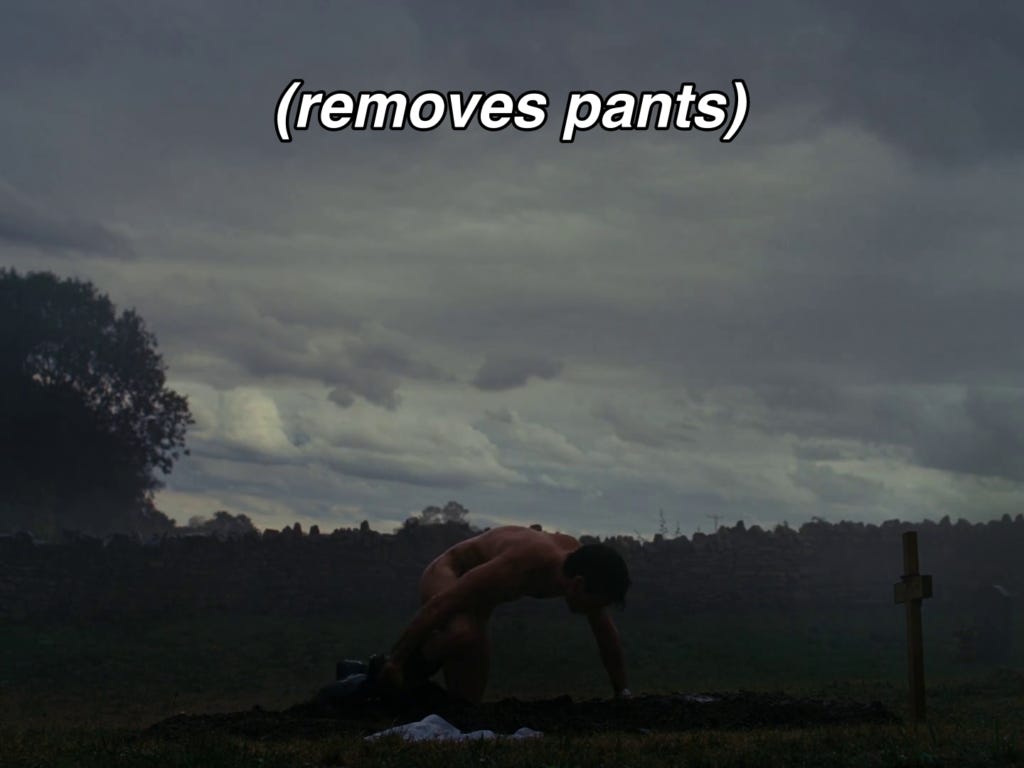
Definitely a weird kid.
Felix’s family now wants Oliver to stay on, well… Felix’s parents do, or more, his mother Elspeth does. Felix’s cousin Venetian certainly doesn’t. Too bad she commits suicide that night in the bathtub.
Shame, really. Terrible shame.
In light of all these tragedies, Sir James feels that perhaps it would be best if Oliver were to go home, as Elspeth has grown a little too attached to Oliver, and Sir James worries that it might be unhealthy. Would it be too much to ask if Oliver were to leave discreetly this very night? Oliver disagrees. How could he leave Elspeth in this state? Sir James offers him money, and has Oliver walked out the back door, as the entire staff watches him go, very knowingly.
A few years pass, and Sir James is dead by his own hand. Devastating, absolutely devastating, but with his nerves being what they were, and what with all these recent tragedies, it’s understandable.
Sad, yes, but understandable.
Then, Elspeth happens to run into Oliver in a coffee shop located in the London neighborhood that she has just so happened to have recently moved to, because she was looking to take a break from Saltburn and its massive and now empty rooms. But upon seeing Oliver again, she invites him to come up to Saltburn again, and stay. And it’s good that she did too, as she soon falls deathly ill, and Oliver graciously stays to take care of her. And upon her passing, he inherits Saltburn from her.
Quite the stroke of luck, that.
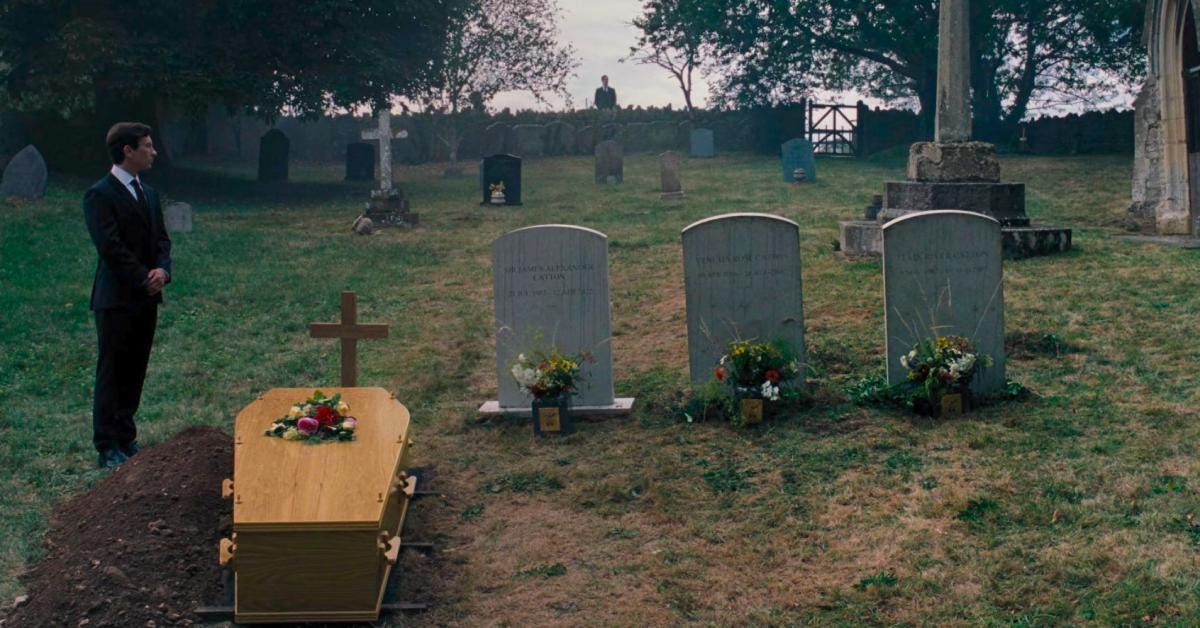
The problem is…
It’s incredibly obvious that Oliver is deliberately behind all of these tragedies. Incredibly obvious. From the way the story is told, not just because of the fact that it’s all being recounted by Oliver himself, but also through the order of events themselves, I can’t imagine the kind of person who would watch this film and not be completely aware of what’s happening. Oliver might as well be wearing a sandwich board with a Robert Durst quote scrawled on it: “I killed them all, of course.” But when the ending reveals the true lengths of Oliver’s manipulations, it starts to seem a little too planned, and the retroactive question of what was real and what was a performance just ends up getting in the way of the film itself.
Was this all really the plan? Did he go to Oxford specifically for this reason? Did Oliver leave his phone in the bathroom for Felix to find on purpose? Did Oliver lie to his parents specifically for Felix to discover the truth? Was the whole thing a test that Felix failed? Or was the whole performance for Oliver’s own amusement?
This doesn’t really matter, because in the end, what with everything else that happens, Oliver’s involvement and his motivations are pretty clear, but with the way the ending removes even the smallest amount of coincidence or opportunity from its events, then it all starts to look like it worked out a little too well. Especially as you will then, quite naturally, start asking questions like… but how exactly does a person orchestrate not one, but potentially two fake suicides, and all without leaving a sign of struggle? I can believe that the Catton family’s high social status, especially in England, and the risk of public embarrassment, could possibly preclude the police from diving too far into these investigations, especially when they’re otherwise clearly all accidents, suicides, and ill health, but still… this only highlights how the film is too busy reveling in the fact the serpent managed to pull off his evil plan within Saltburn’s garden of Earthly delights to be bothered to go into the details that really are the story’s meat.
I hate to bring up Woody Allen basically… ever, but if you’ve ever seen Match Point, then you know what I’m talking about. The story isn’t that there’s a wolf amongst the sheep, the story is how the wolf manages to fool the shepherd into believing that he isn’t actually a wolf at all, but that he is naught but an innocent sheep himself, and all despite the blood painting his muzzle.
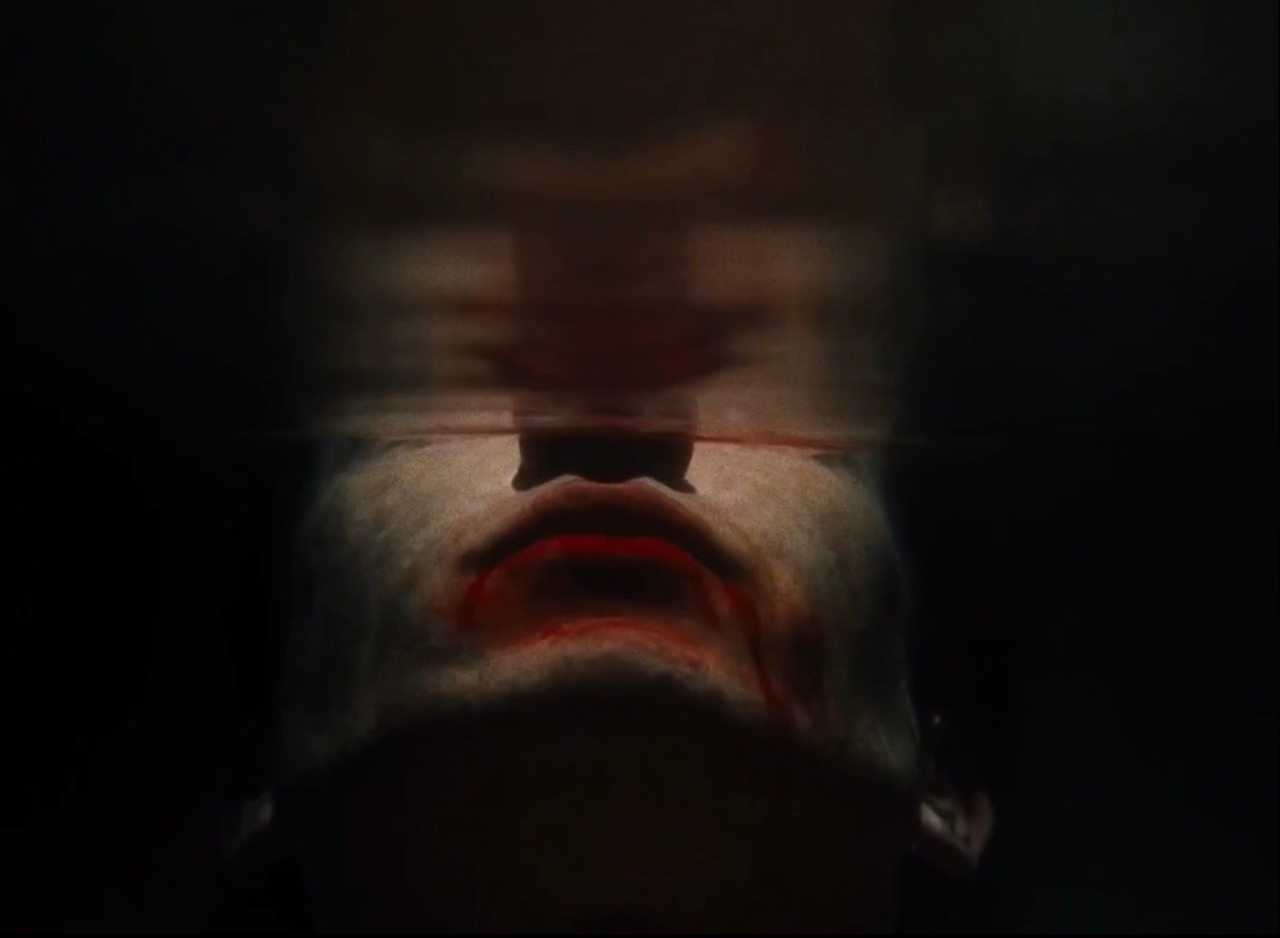
Also, in light of the ending, the question of Farleigh, the banished American cousin, now seems like an unresolved plot line. Because he can smell his own, Farleigh knows that Oliver is a fake and an opportunist, if not the true extent of just how deeply this particular suburban Scorpion is compelled by his own very nature to sting… although he probably does now.
This is the whole issue for me.
Farleigh has to have seen the end result of this story from wherever he is currently exiled to—probably poor and trapped in America with his nearly-destitute, family embarrassment of a mother, having fallen from her former scenester glory—and he’s definitely no dummy, so he probably knows exactly what happened, just like he also knows that Oliver is behind his banishment. So, why wouldn’t Farleigh contact the British authorities, and tell them what he suspects? Unspoken social mores aside, I have a hard time believing that at least one detective in England wouldn’t glance at this situation and go…
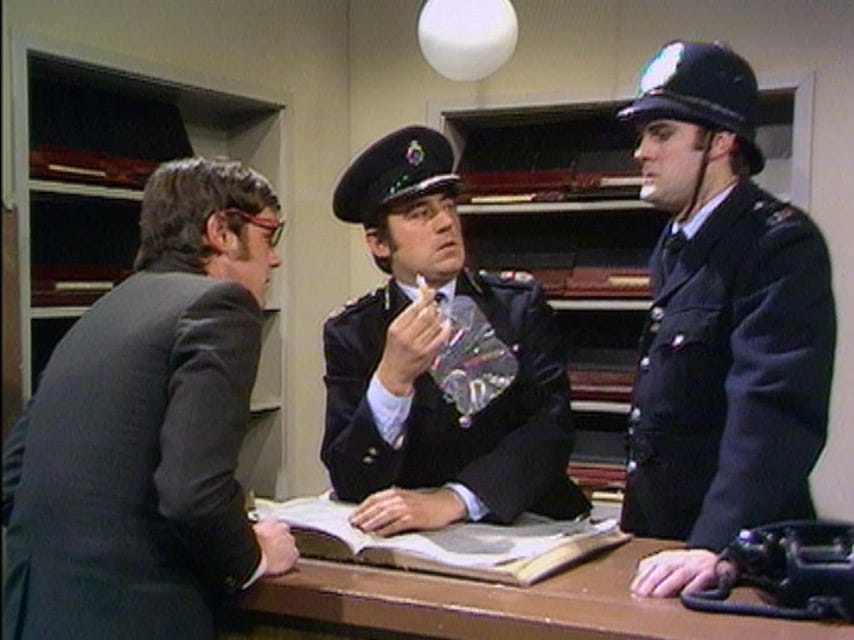
“Whot’s all this then? Dis bloke walks in'a'this family’s life, an' 'hey’re all brown bread wi'hin a few years, an' nah ‘e owns their 'ouse… an' their bees and honey? Bloody 'ell! tha' does seem a migh' peculiar, eh, guv?”
(Nailed it.)
I hate asking questions like this, because a better story would’ve addressed them.
Additionally, the question of what exactly the ever-present staff of Saltburn knew of what was happening on the grounds nags at me. I assume Downstairs actually knows everything that’s going on Upstairs. Everything. That’s how it works, right? Especially in light of the way they fixed the mirror in Oliver’s room, the one that he broke when he punched it in anger, and all within the same day too. This is a moment in the film that, other than clearly highlighting how aware the staff is of the events going on in the house, how they’re always there, watching and unseen, and how quickly they move to put things back in proper order, I don’t really understand the point of it.
But anyway, my point is, while I get that they’re probably somewhat constrained by the social contract of Upstairs and Downstairs, at least in theory, I have a hard time believing that at least one of them wouldn’t have reached out to the cops… especially after the fourth murder.
The scene where the staff watches Oliver be escorted out the back door further muddies the staff’s motivations for me. Especially after we see how upset Saltburn’s butler, Duncan, is at Felix’s death. Throughout the film, Duncan is definitely keeping an eye on Oliver, and very obviously doesn’t approve of his presence. Duncan is who walks Oliver out. This is obviously at Sir James’ order, but in light of the other scenes, it does seem like it’s an order Duncan enjoys seeing to. Then, outside the back door, the servants are all there, largely silent as they watch him go. Now, they could all just be back there on a smoke break, except that one servant acknowledges Oliver leaving, giving him a small little wave that, to me at least, seemed mocking, which admittedly probably added a slant to all of their postures for me, one that said they were also very happy to see this pretender shown the door.
But the fact that the staff then never shows up again, that Duncan particularly never shows up again, despite being directly mentioned by Oliver to Elspeth in the London coffee shop, not even when Oliver comes back to Saltburn, not even when Elspeth falls ill, and especially not even as Oliver is dancing, naked and victorious, from room to room within the great manor… It feels like another plot line that was left dangling.
Heh… dangling.

Somewhat spoiled by its overly-explanatory and obvious tell-all ending, and then going on to overstay its welcome somewhat, Saltburn is overall a pretty decent, if somewhat obvious tale of a fox in the henhouse, some vicious social climbing, and some well-deserved working class revenge. In the end, it’s fun, but it’s also mostly exactly what you’d expect from a Talented Mr. Ripley riff.
